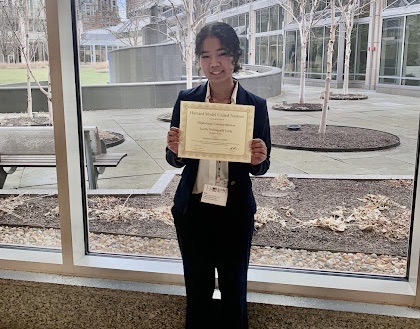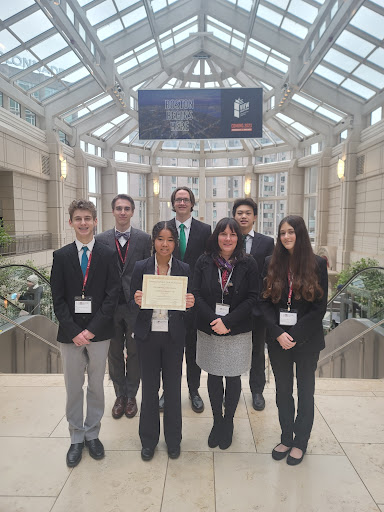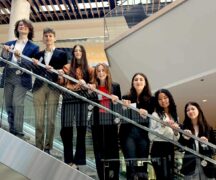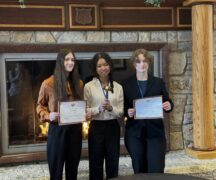By JULIE CARLE
BG Independent News
Ashley Knowlton negotiated potential quotas for women representation in world governments.
Lucy Nomaguchi-Long considered how best to prepare for the next pandemic.
Sam Challu and Kirby Bucks discussed dealing with unexploded ordnances, and Joe Boyle and Alex Xu participated in talks on cyberwarfare and cybercrimes.
On a mock world stage at the Harvard Model United Nations Conference Jan. 26-29, the six Bowling Green High School students assumed roles of world leaders and international decision-makers for the UN simulation. As they addressed pressing international issues and worked to reach consensus on solutions, they sharpened their negotiating, critical-thinking and public speaking skills, and gained a whole new perspective about what it means to be a global citizen.

The Bowling Green team has competed in other Model UN conferences, mostly in Ohio, but with more than 4,000 participants from 60 countries, the Boston conference was the biggest and most prestigious to date.
As soon as the team learned they were accepted and that they would represent Iraq in the discussions, they started researching the country’s profile, international actions and policies.
“To research, it’s important to understand the background of the topic, what your country has been doing and understanding where they are coming from,” Challu said.
Though they might not personally agree with a country’s stance, backed by research, “it’s not difficult to separate what you believe from what the country’s perspective is,” he said.
Each student researched and wrote papers based on their committee assignments, but they also shared their research to broaden each other’s understanding before the conference.
Global issues on the table
The Harvard Model UN organizers selected a variety of critical issues for the committees to address. The Futuristic General Assembly Committee, set in the year 2050, worked on the topic, “Preparing for the Next Pandemic.”
The issue wasn’t as controversial as some of the other topics. “Everyone wanted to work together, so it was about finding the best solutions for the issues, including antimicrobial resistance, vaccine hesitancy and vaccine inequity,” said Nomaguchi-Long, a sophomore who is a two-year member and club vice president.
Iraq, as a developing country, was focused on increasing its access to vaccines by creating a global vaccine alliance or a global disease surveillance system. “It was interesting to meet with other countries to hear their ideas and policies. We had productive debates and discussions,” she said.
Nomaguchi-Long received a Diplomatic Commendation for her ability to share ideas and work well with others on the committee of approximately 120 delegates.
“Initially, it was hard to insert myself and to get noticed. It’s a lot easier when you are tall and a guy,” she said. “However, I realized that even though the bigger, more powerful delegates may have been charismatic, there wasn’t as much substance behind their words. I tried to be that substance, always writing papers, coming up with ideas, and eventually people noticed and started coming to me.”
“In a delegation of six and somebody wins an award at such a large conference – that’s huge! I’m really proud of Lucy and all of her efforts. It really opens up opportunities for so many people,” Knowlton said.
Knowlton, a junior who has been on the Bowling Green team for two years and currently serves as president, worked on the World Conference on Women Committee. The focus of the committee–to involve more women in government leadership–was internationally controversial. Larger countries were pushing for higher quota systems, and better education and literacy rates for women around the world.
“Iraq was negotiable on this topic. Iraq and other Middle Eastern countries came together to talk about and negotiate what we could and could not give up in the resolution,” Knowlton said.
They worked with other nations’ representatives, including the Permanent Five (China, France, Russia, the United Kingdom, and the United States), to merge the countries’ working papers into an agreeable resolution.
“It was difficult, but the process gave me an overall understanding of how other countries are thinking. Normally, as an American you don’t really think about what other countries would want and why and the reason behind it, but when you hear countries talking and why they don’t want women, it’s interesting. It was a good committee to learn,” she said.
As a dual delegation, Challu and Bucks dealt with explosives for war that were deployed but did not explode and still posed threats. “In Iraq, it’s very important because there has been a lot of conflict in the country,” said Challu, who is a sophomore and first-year member of the club.
The Special Political and Decolonization Committee evaluated the current standards for reparations for the unstable ordnances and developed new accountability measures for the international community to address the ordnances.
“The larger countries were pushing to pay fewer reparations to the Second and Third World nations, but from Iraq’s perspective, we wanted the United States and other large nations to be obligated in some way to provide long term funding,” Challu said.
Harvard lessons learned
Beyond the advantages of being involved in topical debates and discussions, the Harvard Model UN provided many additional teachable moments for the students.
Not only was the conference bigger than the other events current club members have participated in, but there was a very different buzz, said Nomaguchi-Long. “I met delegates from Lebanon, Italy, the UK, Japan and Colombia,” she said.
“There was a lot more diversity. Wherever you went you heard different languages and cultures coming together,” Knowlton said. “I feel like it opened my eyes and so many other people’s eyes about accepting diversities and understanding there will be different viewpoints in the world. People are going to think differently, but in the end, everyone wants peaceful negotiations. It can prove that the world can be united”
Challu recognized the experience of meeting people from over 60 countries all at one time as “one of the greatest opportunities you are going to have in your life. Getting to do this at Harvard Model UN so early on is invaluable. We will all be constantly referencing it in our lives, and we will be remembering and building off of these experiences.”
The friendships they forged and the memories they created will last a lifetime. They shared numbers and social media accounts with participants from other countries and other states in the U.S. to stay connected beyond the conference.
“Initially, it was about finding countries that share similar interests, but by the end, after going to lunch with them and talking to them about what life is like at home, we solidified a group of friends that we connected with,” said Challu, who also had the added opportunity to explore where his father attended graduate school.
Mary Kern, club advisor and French teacher at the high school, said Model UN overall is a great experiential learning tool to help students develop skill knowledge and learn about important world topics. In addition, the Harvard trip helped them learn “smaller life skills like how to travel, pack, and get through security.”
Traveling to Boston as teammates also created stronger bonds among the members, an outcome that will help as the club continues to grow.
The six who traveled to Boston are part of the current 21-member, and growing, roster, said Kern.
More than an educational club
The high school Model UN club brings together students from various backgrounds, from sports to drama to music to the sciences, who otherwise may not have opportunities to interact, Kern said.
The club was started in about 2002 by Theresa Dunn. Kern took over the reins when Dunn retired. Dr. Marc Simon, chair of the Bowling Green State University political science department, has been instrumental in assisting the high school club over the years. He helped organize a BG Model UN conference and the university Model UN club members judged the high school teams.
“Model UN is not just an educational club; it’s for new experiences and socializing. It’s so much more than what it looks like at face value,” Challu said. “The skills you learn are so applicable to every other part of your life.”
“We teach the members about Model UN skills like parliamentary procedures, how to write papers, speak and about the mock simulations” in preparation for the conferences they attend each year, Nomaguchi-Long said.
A lot of the work for the conferences is done by individuals, but “we are all in one delegation and we help each other along the way,” Knowlton said.
“Being in Model UN has taught me a lot about people, collaboration and how to work with others,” Nomaguchi-Long said. “Learning about all these international issues and seeing all these different perspectives really broadens your mind and the way you see things.”
Knowlton credits the club for helping her understand her identity. “I came into the club not really knowing myself and what I wanted to be. “ It helped strengthen her overall view of the world and her self-confidence.
“I think it’s really important to involve yourself in clubs like Model UN that can help open your horizons, meet lots of new people and prepare you for life after high school and beyond,” she said.
The conference trips also are college visits where students can experience college life and see what it is like to be on a college campus. Though the number of conferences the team attends and the number of students who can go depends on the amount of funds the club raises. The club’s small base makes it difficult to raise significant funds, Kern said. She believes the school, the district and the community benefit from the club’s outcomes.
“These students are living and learning how to be global citizens through the Model UN experience,” Kern said.
Representing Bowling Green
Whenever the Model UN students participate in conferences, whether they are in Ohio, Boston or online, they are representing “the brilliant minds of Ohio,” Knowlton said.
“At Harvard, we got to represent a part of Ohio that often gets overlooked. It’s cool to represent Bowling Green High School and the community in a place where opportunities are plentiful,” Challu said.
“I was glad to meet many international students and show a positive example of my school and my community,” Nomaguchi-Long said.
In the next 10 years and beyond, many of these students who have come together during Model UN conferences, done research and worked tirelessly to discover solutions to world problems will be the ones who will be committed to finding real solutions, Knowlton said.
“You can look forward to the future, because we are this whole, younger generation that wants a better world of united nations.”



